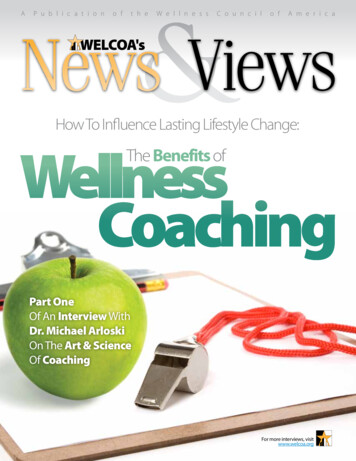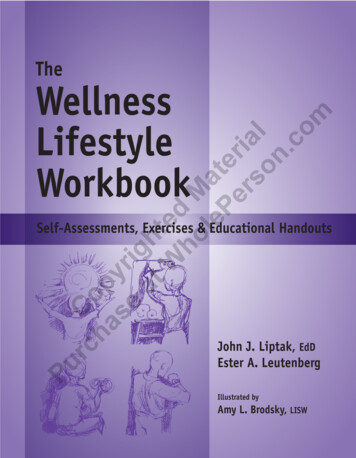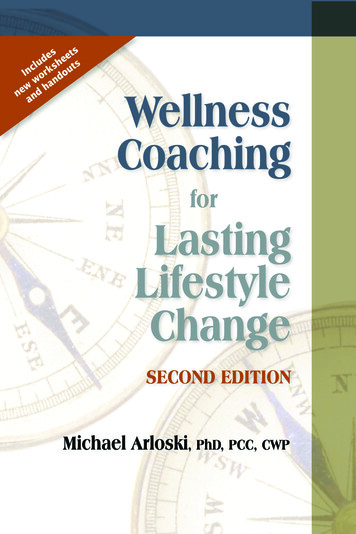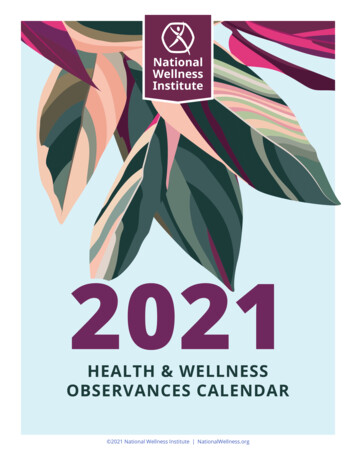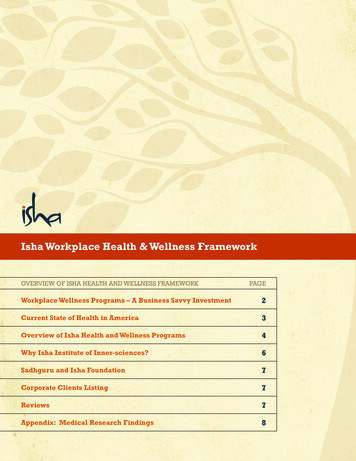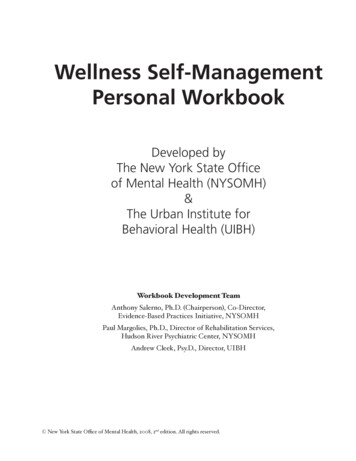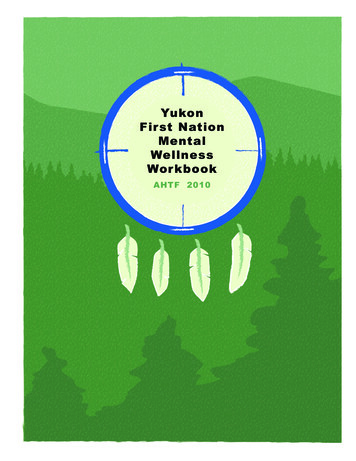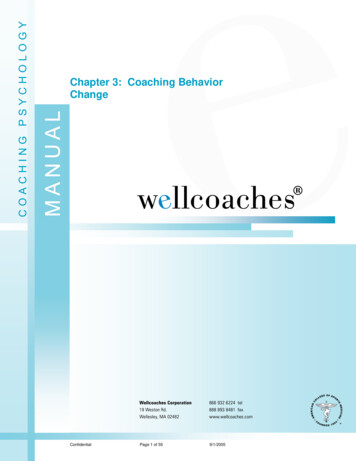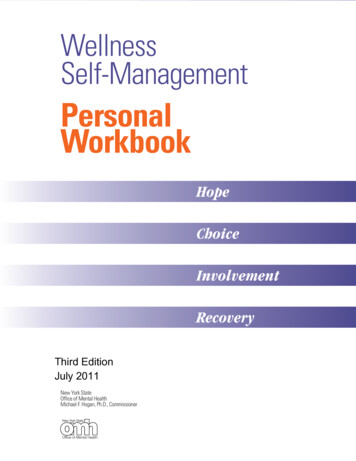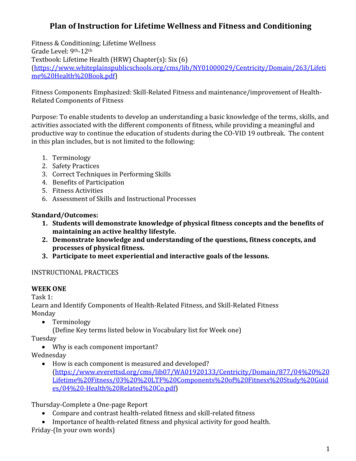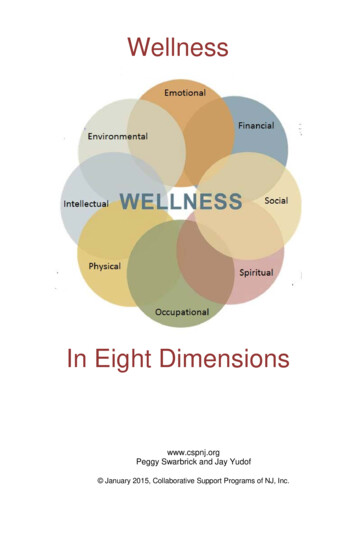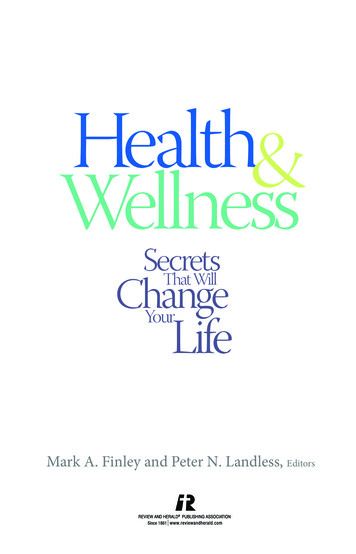
Transcription
Health&WellnessSecretsThat WillChangeYourLifeMark A. Finley and Peter N. Landless, Editors
Copyright 2014 by Review and Herald Publishing AssociationAll rights reserved. No portion of this book may be reproduced, storedin a retrieval system, or transmitted in any form or by any means (electronic, mechanical, photocopy, recording, scanning, or other), exceptfor brief quotations in critical reviews or articles, without the prior written permission of the publisher.The Review and Herald Publishing Association publishes biblicallybased materials for spiritual, physical, and mental growth and Christian discipleship.Unless otherwise noted, Bible texts in this book are from the King JamesVersion.Scripture quotations credited to NIV are from the Holy Bible , New International Version. Copyright 1973, 1978, 1984, 2011 by Biblica, Inc.Used by permission. All rights reserved worldwide.Texts credited to NKJV are from the New King James Version. Copyright 1979, 1980, 1982 by Thomas Nelson, Inc. Used by permission.All rights reserved.Edited by Gerald WheelerCopyedited by Jeremy J. Johnson and Ted HesselInterior design by Emily Ford/Review and Herald Design CenterCover design by Bryan Gray/Review and Herald Design CenterCover art ThinkstockPRINTED IN U.S.A.18 17 16 15 145 4 3 2 1Library of Congress Control Number: 2014936041ISBN 978-0-8280-2803-5
ContentsPrefaceWhy You Need This BookChapter 1Designed for Something Better135Chapter 2Diet for a Lifetime20Chapter 3Are You at Risk?28Chapter 4Fit for Life36Chapter 5Healthy Relationships44Chapter 6You Are What You Think51Chapter 7Hope Beyond Depression60Chapter 8Breaking Free68Chapter 9Bouncing Back78Chapter 10Rest for Our Restlessness83Chapter 11The Healing Power of Faith91ConclusionHealth to the Max100
To order additional copies of Health and Wellness,call 1-800-765-6955Visit us at www.reviewandherald.com for informationon other Review and Herald products.
PrefaceWhy You Need This BookHealthy choices lead to healthier lives: choose to live.Alist of the 100 confirmed oldest people in modern times in theworld ranges from 113 to 122 years.1 Only six of these supercentenarians were still alive at the beginning of 2014, but manyothers can appear in the future. Medicine promises to increaseconsiderably human life expectancy during the next decades. Untilthen, you can do your own part to live longer and better. While research on twins suggests that 20 to 30 percent of a person’s life spanis related to genetics, many other studies have shown that longevitydepends greatly on lifestyle.2Modern medicine has created sophisticated techniques to improvehuman health. Yet nobody who knows the figures can say that thewar has been won. Seeking health is a daily challenge for every government and each person. If you like numbers, here are a few facts: The estimated global health-care services market for 2015 is 3 trillion, which makes the health-care industry one of the largestsectors of the world economy. In most developed countries healthcare consumes more than 10 percent of the gross domestic product. The global pharmaceuticals market is worth more than 300billion a year. The 10 largest drug companies (six based in theUnited States and four in Europe) have sales of more than 10billion a year and profit margins of about 30 percent. On the otherhand, the cost to develop a single drug may surpass 1.3 billion.3 Worldwide, according to the World Health Organization, in2006 there were more than 59 million health workers, including9.2 million physicians, 19.4 million nurses and midwives, 1.9million dentists and other dentistry personnel, 2.6 million pharmacists and other pharmaceutical personnel, and more than 1.3million community health staffers. Those numbers would be5
health and wellnesseven larger today. However, even then there was a shortage ofmore than 4 million physicians, nurses, midwives, and others.4 Unnecessary suffering is still a grave problem in the world, foronly one in 10 of those who need palliative care, including painrelief, currently receive it.5 Just in the United States alone, according to a study fromGeorgetown University’s Center on Education and the Workforce, it is estimated that the health industry must create 5.6million new jobs by 2020 to meet the growing demand.6 One big challenge today is the aging of society. The global population is getting older. It has been predicted that by 2050 thepercentage of people more than 60 years of age will increasefrom 21 percent today to 32 percent in developed countries andfrom 8 percent to 20 percent in less-developed nations.7Health is the dream of poor and rich alike. “When I was an intern atJohns Hopkins,” Dr. Ben Carson, a famous neurosurgeon, reports, “Iwas very impressed by the caliber of patients that I saw on the wards.There were many heads of state, royalty, and heads of many large organizations. Many of them were dying of horrible diseases and would gladlyhave given every title and every penny for a clean bill of health. Thisreally puts into perspective the things that are truly important in life.”In fact, without health most other things are not that important.For this reason we need to pay a great deal of attention to the maintenance of good health and not just become concerned when somethingthreatens it. And when we talk about health, we must think not only ofits physical dimension, but also of its mental and spiritual facets. Ourduty is to optimize all three of these aspects in our own lives and in thelives of everyone else in the world. “As a physician, I have frequentlybeen able to witness the joy associated with restored physical andemotional health,” Dr. Carson reveals, “but this is minor comparedto the potentially everlasting joy associated with spiritual health.”The world has become such a complex, dangerous, and sick placethat making good choices is more important than ever. To minimizeor prevent problems is the best strategy to have a safer and morefulfilling life. Here enters the message of this book, whose aim is tohelp people improve their quality of life.6
preface: why you need this bookMost likely you have begun reading this book because you desireto live a longer, healthier, and happier life. That is a noble goal, because you have been made to live forever. If you follow the principles and tips presented here, this dream may come true. You deserveto live well and be happy.Furthermore, we are much more valuable than may appear at acasual glance. Take the human body, for example. When researchers add up the chemical value of our body’s component parts, theymight conclude that we are not worth much. Yet even then Wiredmagazine estimates that if we consider the monetary value of ourhearts, lungs, kidneys, DNA, and bone marrow, we are individuallyworth up to a whopping 45 million.As a rational, thinking, living human being with the enormouscapacity to love and experience life’s greatest joys, you are evenmore valuable than 45 million, and that is what this book is allabout. You are embarking on a journey of discovery that has thepotential to be life-changing. The principles of better living and thepractical lifestyle suggestions you will discover in every chapter canmake a real difference in the quality of your life. You can live life tothe fullest and discover joy to the max.As you scan these pages and consider your personal health, youwill recognize that to achieve life’s greatest happiness you will probably need to make some positive steps. But rather than overwhelming yourself with multiple changes, choose to begin by taking a fewsmall steps at first. For example, as you succeed in increasing yourexercise, or reducing the amount of sugar and refined foods in yourdiet or getting more rest, your resolve will increase, and your abilityto make healthy choices will become stronger.Good health is a state that we all desire, but sadly, many peoplerealize its worth and value only once they’ve lost it! Here is an opportunity for you to evaluate your health and lifestyle carefully, notjust hastily make a few resolutions that rapidly fly out the window.Do you feel that you’re getting the best out of life in all its facets?Have you recently assessed your total health, including its physical,mental, social, and spiritual aspects?You may assume that you manage your day-to-day routines of7
health and wellnesseating, working, and sleeping quite well. But are you enjoying a realquality of life? Have you ever considered that life may have muchmore to it than you are currently experiencing?Medical ProgressDuring the twentieth century medical science made great stridestoward increased good health as its understanding of physiologyand disease processes grew. Public health measures that improvedsanitation, sewage disposal, and the delivery of clean water to communities positively affected both the quality and longevity of lifefor millions. The development of vaccinations and immunizations—one of the most cost-effective ways of preventing infectiousdiseases—eradicated smallpox toward the end of the twentiethcentury and greatly decreased the ravages of polio and diphtheria.Reported cases of measles, mumps, rubella, tetanus, and diphtheriahave plummeted about 90 percent because of immunizations.Infectious and communicable diseases—those spread by bacteria,viruses, fungi, and parasites (for example, tuberculosis, malaria, andhepatitis)—continue to cause significant problems worldwide. AndHIV and AIDS claimed the lives of an estimated 1.7 million peoplein 2011 alone. Yet we cannot underestimate the tremendous stridesin health care.Unfortunately, such advances in medicine also have another sideto them. As world governments and public health experts focusedon treating, controlling, or eliminating infectious (or communicable) diseases, noncommunicable or lifestyle ones skyrocketed.Today such noncommunicable diseases have become entrenchedin all societies of the world—developed and emerging economies,affluent and poor. They are mainly lifestyle-related and pose a hugethreat to our health, happiness, and longevity. It is highly likely thatsomeone close to you has died because of cancer, coronary heartdisease, stroke, diabetes, or chronic respiratory diseases.What Is Your Health Issue?You may be feeling good up to now because you do not smoketobacco or drink alcohol, but what about your diet and salt intake?8
preface: why you need this bookThe foods we choose to eat largely produce the various noncommunicable diseases. At least 40 percent of all deaths from these kinds ofdiseases result from the consumption of foods high in saturated andtrans fats, salt, and sugar (and refined carbohydrates). Are you selecting your foods wisely and carefully, focusing on variety and goodnutrition within the bounds of your budget? Simple actions such ascutting back on salt, reducing food portion sizes, and eating morefruits and vegetables can make a huge difference to your health. Ifyou are into junk foods, irregular meals, excessive salt, large amountsof fat, a highly refined food diet, or large portions, know that life canbe much better, and that’s why this book is just for you.Of course, to enjoy the best health possible you should be exercising daily. You might say, “I get up off the couch for a snack duringevery TV commercial, and I walk the 100 feet from the closest parking spot to the grocery store.” But do you have a regularly planned,systematic exercise program?Health professionals encourage us to walk 10,000 steps daily! Weshould be physically active for at least 30 minutes each day in orderfor our wonderful body to function at its best. So if you’re groaningthat you’re too busy to exercise, but really want to begin a practical,sustainable exercise program, keep reading.What about your interpersonal relationships? Do you havefriends you care about, younger people you mentor, individuals inneed whom you help? Social support and connectedness to God andothers are also health-giving! Perhaps you have broken relationshipsin your life that need mending. Keep reading. God has a plan for youthat is far better than you can ever imagine.Are you happy? Do you wake up with purpose, walk with “pepin your step,” and have a smile on your face? Or has life becometoo much? Are you anxious or downhearted? Does the future lookbleak? Do you struggle with dark thoughts of meaninglessness,failure, and defeat? As we explore scientific facts and discover lifechanging principles of the Bible that we can universally apply, youwill see that the possibility of happiness is real.We can almost guarantee that disappointment, heartache, andtrials will afflict our lives at times, because we dwell in a sin-filled9
health and wellnessworld. But God is bigger than our trials, greater than our difficulties,and larger than our challenges. We may be weak, but He is strong.God is our assurance when we face uncertainty. Should guilt threatento overwhelm us, He can be our peace. He is our wisdom when wefind ourselves perplexed. When we are imprisoned in the chains ofseemingly unbreakable habits, He stands ready to offer supernaturalpower to free us. And when we are lonely, He is forever near.Thus, whenever we face paralyzing anxiety and overwhelmingfear, God’s words still speak to our hearts: “Come to Me, all you wholabor and are heavy laden, and I will give you rest” (Matthew 11:28,NKJV). Should the burdens of life appear insurmountable, He urgesus to cast “all of our care upon Him, for He cares” for us (1 Peter5:7, NKJV). And when the future seems uncertain, He reminds us:“Fear not for I am with you; be not dismayed for I am your God. Iwill strengthen you. Yes, I will help you, I will uphold you with Myrighteous right hand” (Isaiah 41:10, NKJV).In God we will find rest and hope for the future. Our loving heavenly Father has given us a road map and instructions on how to havehealth and wellness—now and beyond, and even into eternity! Wewere born for something much more than just struggling through afew decades and then dying. God intended for us to live the abundant life today, tomorrow, and forever.The Lord has a plan for your life that is far more than amazing. AsHis personal concern, He wants you to live life in all of its fullness.He longs that you experience joy beyond measure. In fact, Jesus said:“I have come that they may have life, and that they may have it moreabundantly” (John 10:10, NKJV). Heaven’s plan for you is a life ofphysical, mental, emotional, and spiritual wholeness.Each chapter in this book is an adventure into really living.As you put their principles into practice, you will notice positivechanges in your life. Some of the benefits of your healthful choiceswill be almost immediate, but most of them will come gradually.Don’t become discouraged or give up too quickly. Continue to makepositive lifestyle choices, and in time you will be astounded withwhat is happening in your life.A loving God made us with the power of choice. Our wills, the10
preface: why you need this bookgoverning power deep within our nature that enables us to choosethe way we think, the physical habits we develop, and the spiritualdecisions we make, are a powerful force in lifestyle transformation.Current medical research is leaning more and more in the directionthat, although our genetics do play a role in determining the state ofour well-being and overall health, choice is a much more influentialand important factor. Our health is not simply a matter of chance.It has a great deal to do with our daily decisions.When we choose to make positive choices, the Holy Spirit comes toour aid to enable us to put those decisions into practice. All of heaven’spower is available to us. Your will may be weakened because of poorchoices, but it is never too late to begin to make healthy ones. You cantake charge of your life and health. Change always begins with choice,and it occurs when we realize we are not mere victims of chance, buthave the freedom to take responsibility for our own health and happiness. Those who decide to adopt the suggestions given here will undoubtedly experience a fuller quality and enjoyment of life.Of course, self-improvement has its limitations. Our biologicalrealities remind us of some insurmountable barriers and define theextent of human accomplishment. But the beauty and value of thisbook is that it offers more than is humanly attainable. As you readit, you will inevitably realize that you can rely on a gracious higherpower. The experience of a spirituality born of a relationship with aloving God can make a huge difference in your life.While we are finite, God and His grace are infinite. Grace is thepower of the omnipotent to grant to the impotent the ability to bewhole—all accomplished through the construction of a relationship. Aswe focus on the whole person—physical, mental, and spiritual—Godoffers us life full of health and wellness. He rains grace down upon usfrom heaven, traversing a gulf that we cannot possibly span. Given tothe undeserving in incomprehensible love, grace permits the experienceof a full and abundant life not only here and now, but also for eternity.In our earthly life, despite our best efforts and compliance withhealthful principles, we cannot escape the lingering shadow of ourmortality. But when a human being reaches across the gap betweenus and God, hope is born! Love rattles the bars of the dungeons of11
health and wellnessdeath. Graves will yet yield to the persuasion of grace. If you desireto improve your health, science can help you. But if you want to liveforever, seek the source of immortal life.1See http://en.wikipedia.org/wiki/List of supercentenarians; and www.grg.org/Adams/B3.HTM.2For an interesting study of long-lived groups, see Dan Buettner, The Blue Zones: Lessons for Living Longer From the People Who’ve Lived the Longest (Washington, D.C.: National Geographic Society, 2008).3Data from the World Health Organization, available at www.who.int/trade/glossary/story073/en/. For other figures, see International Federation of Pharmaceutical Manufacturers and Associations, “The Pharmaceutical Industry and Global Health: Facts and Figures2012,” available at FPMA- FactsAnd Figures 2012 LowResSinglePage.pdf.4World Health Organization, “Working Together for Health,” available at www.who.int/whr/2006/whr06 en.pdf?ua 1.5See World Health Organization, ive-care-20140128/en/. Map available at: e-care/.6A. P. Carnevale et al., “Healthcare,” p. 8, available at care.FullReport.090712.pdf.7See World Economic Forum, “The Future of Pensions and Healthcare in a RapidlyAgeing World: Scenarios to 2030,” available at www3.weforum.org/docs/WEF ScenarioPensionsAndHealth2030 Report 2010.pdf.12
Chapter 1Designed for Something BetterWholeness is the Creator’s gift: pursue it!American author Annie Dillard wrote about an old woman whosaid: “Seem like we’re just set down here,” “and don’t nobodyknow why.”1Don’t nobody know why? Even through the butcheredgrammar, the passion of the perennial questions—Who are we?How did we get here? How should we live? What is our purpose?—rises from her words. They are important words, too, because wecan no more live a full and healthy existence without knowing itsorigin and purpose any more than someone who thinks an iPad’s2just a board on which to cut radishes and onions in the kitchencould get full use out of it.Humanity has come up with various theories and stories to explain our origins. One of the oldest teaches that some god squashedanother god flat (whose body became the earth), and that each timethe victorious god spit on the flattened corpse of his vanquished foe,a human appeared. On the other hand, one of the newest teachesthat we don’t exist at all, but are computer simulations created by asuperintelligent race of aliens.In between these two views hover others, including atheist AlexRosenberg’s claim that we exist as meaningless material entities in ameaningless material universe. “What is the purpose of the universe?There is none. What is the meaning of life? Ditto.”3 If, however, themeaninglessness of a purely materialistic universe depresses you,don’t worry, because, according to Rosenberg, your depression isnothing but specific arrangements of neurons and chemicals thatyou can then alter with pharmaceuticals.In contrast to the various theories and stories of how we came tobe here on earth, the biblical view remains, even today (and despiteendless assaults against it), the most rational, hopeful, and practi13
health and wellnesscal explanation for the origin and purpose of human existence. Andwhile certainly incorporating the materialist perspective—indeed,even celebrating it—the biblical worldview isn’t limited only to it,for to do so would be again like using an iPad only as a cutting board.IntentionsIn contrast to the prevailing premise of modern science that viewsthe earth’s living things as just accidents (a premise actually based onphilosophy, not science), Scripture depicts the formation of life as adirect act of the Creator. In the book of Genesis everything is purposeful—nothing happens by chance. We are not simply an accidental conglomeration of randomly arranged chemicals. The formula“And God said, Let . . . and it was so” appears repeatedly throughoutthe Creation account in Genesis 1 and reveals direct and purposefulintentionality. Each line rejects the idea that anything is just random.Such intentionality is especially significant when it comes tohuman beings. Instead of merely speaking us into existence andlife, as He did all other earthly living things, God formed Adam outof the ground and then breathed into him life itself. “And the LordGod formed man of the dust of the ground, and breathed into hisnostrils the breath of life; and man became a living being” (Genesis2:7). It is an act of intimacy that, among other things, has made humanity the only being created in the “image of God” (Genesis 1:27).Creation culminates with human existence, as if all that occurredon the five days before us were only for us. After He created humanity on the sixth day, God rested on the seventh (Genesis 2:2), because His work was done: “The heavens and the earth were finished,and all the host of them” (verse 1).Christian author Ellen White wrote that “after the earth with itsteeming animal and vegetable life had been called into existence,man, the crowning work of the Creator, and the one for whom thebeautiful earth had been fitted up, was brought upon the stage ofaction. To him was given dominion over all that his eye could behold.”4 In contrast to the currently prevailing philosophical schoolof thought, one that says that we just happen to be here, we were,instead, meant to be here.14
health and wellnessTweaking of DialsThough Genesis teaches that God created the earth especially forus, recent scientific discoveries have pushed that realization waybeyond our planet, even to the cosmos itself. They reveal numerous finely tuned physical constants that don’t allow for the slightestdeviation without making our existence impossible.For example, if the ratio between the force of electromagnetismand the force of gravity were changed by 1:1040, humans wouldn’tbe here. What does 1:1040 mean? Mathematician John Lennox explains: “Cover America with coins in a column reaching to the moon(236,000 miles or 380,000 kilometers away), then do the same for abillion other continents of the same size. Paint one coin red and putit somewhere in one of the billion piles. Blindfold a friend and ask herto pick it out. The odds are about 1 in 1040 that she will.”5Numerous other finely tuned factors in the cosmos, such as thedistance of the earth from the sun, the speed of the earth’s rotation,the energy level of carbon atoms, and the expansion rate of the universe, had to have been just right or else humanity could not havebeen created. Scientists have labeled these amazing ratios “anthropiccoincidences”—“anthropic” from the Greek anthropos (“man”), and“coincidences” because, despite such mind-boggling ratios, if yourule out a Creator, what else could they be?Nevertheless, such grossly misnamed “coincidences” help affirmwhat Genesis teaches: We exist in a creation that was expecting us.This point is important because foundational to our health and general happiness is a sense of meaning, of purpose. Holocaust survivorand psychiatrist Viktor Frankl argued that, at our core, we humansmust find meaning to our existence or else we will live without hope,and hope is crucial to human well-being.In short, Genesis tells us that instead of being a mere “chemicalscum”6 on the surface of the earth (Stephen Hawking), we are beingscreated in the image of God and we are to reflect His character andreveal His goodness and power as we ourselves marvel in that powerand goodness and grow and mature in them. Created for a reason,we find meaning and purpose, including health and well-being, byseeking out and following God’s intentions and desires for us.16
designed for something betterIntegrated WholenessBesides teaching that we were meant to be, Genesis also reveals whatwe are. Contrary to the ancient pagan notion that separates flesh andspirit into distinct realms (with flesh bad and spirit good), Scriptureteaches what some call “an integrated wholeness,” the idea that all aspects of a human being—physical, mental, and spiritual—form a singleunit, and that one doesn’t exist without the other. When God breathedinto Adam the breath of life, the Bible doesn’t say that Adam receiveda soul, as if it were an entity distinct from him, but that he became a“living soul” (nephesh hayah). A living soul was what he was, not whathe possessed. Interestingly, the Bible uses the same phrase for the animals as well: “So God created great creatures of the sea and every livingthing [nephesh hayah] that moves, with which the water teems and thatmoves about on it” (Genesis 1:21, NIV; see also verse 24). Though,obviously, different in many ways from whales and turtles, Adam was,like them, a living being, a nephesh hayah.Such an understanding can protect us from two extremes. Thefirst, a sharp dualism, emphasizes the spiritual over the physical,even to the point that it can deride the physical as evil. From Genesis onward, however, in which God deemed the completed earth as“very good” (Genesis 1:31), Scripture celebrates the physical worldas a product of His creative power. Even our bodies, though fallen,are still the creations of God and need to be respected as such: “Ordo you not know that your body is the temple of the Holy Spirit whois in you, whom you have from God, and you are not your own?”(1 Corinthians 6:19, NIV). The idea of our body’s being bad, as opposed to a pure and eternal soul trapped in the body and eagerlyawaiting release, is a pagan notion that not only makes an unwarranted division in human nature, but denies the importance of acrucial and fundamental aspect of our humanity.The second extreme, the opposite, denies the spiritual altogether(as we saw with Alex Rosenberg) and limits all reality, includingevery aspect of humanity, to nothing but molecules in motion.This is, too, the philosophical presupposition, or assumption, uponwhich so much of modern science rests.The biblical view, which emphasizes the reality and importance of17
health and wellnessthe physical, spiritual, and mental elements of our humanity, becomesespecially vital in the search for health, healing, and happiness. Ourminds and bodies are inseparable aspects of our existence, and anyprogram that seeks to bring us the best life needs to account for allaspects of our fascinatingly complicated humanity. Health includesevery facet of our being. To be in good health is to be mentally alert,emotionally well adjusted, physically well, and spiritually in harmonywith our Maker. Much more than the absence of disease, it involvesour minds, our emotions, our bodies, and our spiritual natures.The Miracle of LifeThe complexity of our total beings prompted the psalmist to write:“I praise you because I am fearfully and wonderfully made” (Psalm139:14, NIV). How could King David (a king, not even a physiologist)have known that he was “fearfully and wonderfully” made? The manwrote almost 3,000 years ago, long before microscopes and X-raymachines, much less CAT scans and MRIs. David didn’t have a cluewhat a cell was, much less about any of its myriad and fantasticallycomplicated parts. What did he know about cell reproduction or protein synthesis? He wouldn’t have even recognized what a protein was.David never heard of DNA, and his mind certainly couldn’t understand (neither can ours, actually) how a single human body has20 trillion meters of DNA , and that our complete set of genes (thegenome) is more than 3.5 billion letters long. What did he knowabout how white blood cells fight invaders, or about the many stepsin the enzyme cascade that leads to blood clotting?Nevertheless, he knew enough to realize what a miracle it wasthat we exist, and enough to praise the God who brought about thatexistence.Wholeness in a Broken WorldHowever wonderfully made, we are still fallen beings in a fallenworld (see Genesis 3), and as such we are susceptible to sickness,pain, and death. In the end, only the redemption found in Jesus,climaxing at the Second Coming, will bring full restoration andhealing to us. Until then, “our first duty toward God and our fel-18
designed for something betterlow beings is that of self-development. Every faculty with which theCreator has endowed us should be cultivated to the highest degreeof perfection, that we may be able to do the greatest amount of goodof which we are capable. Hence that time is spent to good accountwh
Chapter 2 Diet for a Lifetime 20 Chapter 3 Are You at Risk? 28 Chapter 4 Fit for Life 36 Chapter 5 Healthy Relationships 44 . To order additional copies of Health and Wellness, call 1-800-765-6955 Visit us at www.
